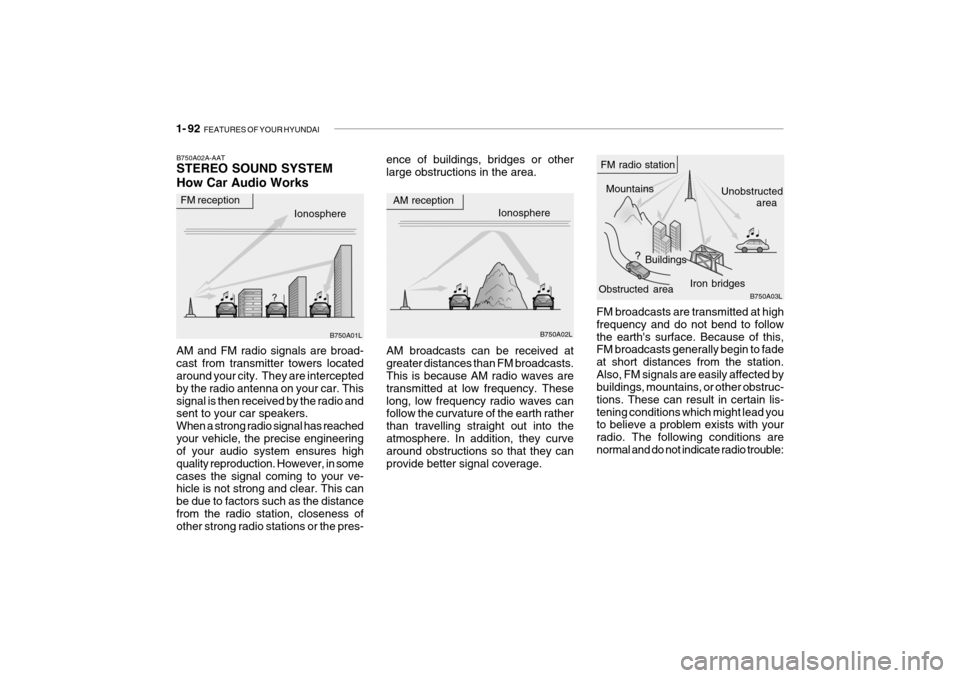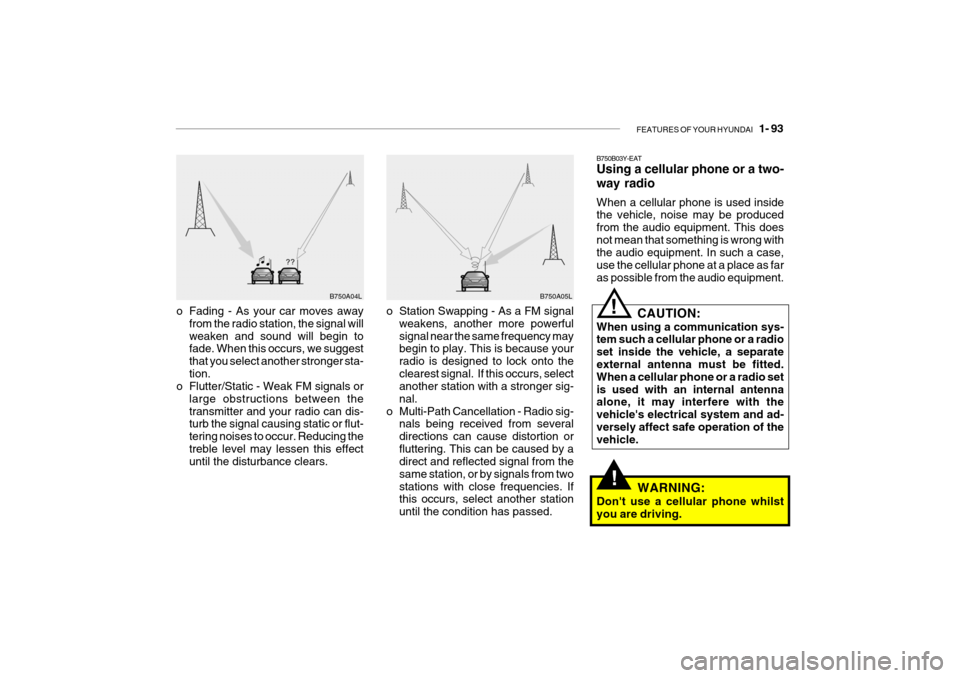Page 348 of 463

1- 82 FEATURES OF YOUR HYUNDAI
2. TAPE mode
o Pressing the upper SEEK switch will
play the beginning of the next music segment.
o Pressing the lower SEEK switch will
start replay at the beginning of themusic just listened to.
3. CD (Compact Disc) mode
o Press the upper SEEK switch once to skip forward to the beginning of the next track.
o Press the lower SEEK switch once to skip back to the beginning of thetrack.
VOL Switch
o Press the upper VOL switch to in- crease volume.
o Press the lower VOL switch to de- cease volume.
Press the SEEK switch 1 sec. or more.
1. RADIO mode When the upper SEEK switch is pressed, the unit will automatically tune to the next higher frequency and when thelower SEEK switch is pressed, it will automatically tune to the next lower frequency.
MODE Switch Press the MODE switch to select Ra- dio, Tape, CD (Compact Disc). Each press of the switch changes the display as follows:
RADIO (FM1 � FM2 �AM) � TAPE � CD
SEEK SwitchB610A01TB-GET AUDIO REMOTE CONTROL SWITCH(Not all models)
The steering wheel audio remote con- trol switch is installed to promote safe driving. NOTE: Do not operate audio remote control switches simultaneously. B610A01TB
�
Page 358 of 463

1- 92 FEATURES OF YOUR HYUNDAI
Ionosphere
B750A02L
AM reception
Mountains
Buildings Unobstructed
area
FM radio station
B750A03L
Ionosphere
FM reception
B750A01L Obstructed area
Iron bridges
FM broadcasts are transmitted at high frequency and do not bend to followthe earth's surface. Because of this, FM broadcasts generally begin to fade at short distances from the station.Also, FM signals are easily affected by buildings, mountains, or other obstruc- tions. These can result in certain lis-tening conditions which might lead you to believe a problem exists with your radio. The following conditions arenormal and do not indicate radio trouble:
AM broadcasts can be received atgreater distances than FM broadcasts. This is because AM radio waves are transmitted at low frequency. Theselong, low frequency radio waves can follow the curvature of the earth rather than travelling straight out into theatmosphere. In addition, they curve around obstructions so that they can provide better signal coverage.
B750A02A-AAT STEREO SOUND SYSTEM How Car Audio Works
AM and FM radio signals are broad- cast from transmitter towers located around your city. They are intercepted by the radio antenna on your car. Thissignal is then received by the radio and sent to your car speakers. When a strong radio signal has reachedyour vehicle, the precise engineering of your audio system ensures high quality reproduction. However, in somecases the signal coming to your ve- hicle is not strong and clear. This can be due to factors such as the distancefrom the radio station, closeness of other strong radio stations or the pres- ence of buildings, bridges or otherlarge obstructions in the area.
Page 359 of 463

FEATURES OF YOUR HYUNDAI 1- 93
!
B750A04L B750A05L
o Station Swapping - As a FM signal weakens, another more powerful signal near the same frequency may begin to play. This is because your radio is designed to lock onto theclearest signal. If this occurs, select another station with a stronger sig- nal.
o Multi-Path Cancellation - Radio sig- nals being received from severaldirections can cause distortion orfluttering. This can be caused by a direct and reflected signal from the same station, or by signals from twostations with close frequencies. If this occurs, select another station until the condition has passed.
o Fading - As your car moves away
from the radio station, the signal willweaken and sound will begin to fade. When this occurs, we suggest that you select another stronger sta-tion.
o Flutter/Static - Weak FM signals or
large obstructions between thetransmitter and your radio can dis- turb the signal causing static or flut- tering noises to occur. Reducing thetreble level may lessen this effect until the disturbance clears. B750B03Y-EAT Using a cellular phone or a two- way radio When a cellular phone is used inside the vehicle, noise may be produced from the audio equipment. This doesnot mean that something is wrong with the audio equipment. In such a case, use the cellular phone at a place as faras possible from the audio equipment.
!
CAUTION:
When using a communication sys- tem such a cellular phone or a radio set inside the vehicle, a separate external antenna must be fitted. When a cellular phone or a radio setis used with an internal antenna alone, it may interfere with the vehicle's electrical system and ad-versely affect safe operation of the vehicle.
WARNING:
Don't use a cellular phone whilst you are driving.
Page 444 of 463
DO-IT-YOURSELF MAINTENANCE 6- 33
G200E01TB
G200E02TB-GAT Inner Panel
FUSE RATING
10A 10A10A15A10A10A 20A 15A10A 20A 10A 15A20A10A10A10A 30A 15A10A15A15A15APROTECTED COMPONENTS
Air conditioner
Stop/Tail Light (LH) A/Bag IndicatorAudio, Electronic Outside Mirror
Turn signal Light, Back-up Light
Stop/Tail Light (RH)Cluster
Power outlet PCM, ABS controlAir BagDoor Lock System, SunroofRear Wiper Motor
Start Relay, 9oTheft alarm system Seat Warmer Rear window DefrosterECM
Hazard Warning Light, ETACM Front Wiper Motor Rear Fog Light
Fog light, ETACM, Power Window, Headlight leveling Device
Blower, SunroofRear window DefrosterHeadlight (RH)Front Fog Light
High Beam Light Indicator, Headlight (LH) Room Lamp, Audio, Cluster
DESCRIPTION
A/C SW
TAIL LH
A/BAG IND
AUDIO
T/SIG
TAIL RH
CLUSTER
P/OUTLET ECU 1
A/BAG
D/LOCK
RR/WPR STARTS/HTD
HTD MIR ECU2
STOP
HAZARD
FRT WPR R/FOG
IGNITION BLOWER PR HTD
H/LP RH F/FOG
H/LP LH
POWER CONN & R/LP
Page 460 of 463

10- 2 INDEX
A
ACTIVE HEADRESTS ................................................ 1-14
ADJUSTING ARMREST ............................................. 1-15
ADJUSTING HEAD RESTRAINTS............................. 1-13
AIR BAG ..................................................................... 1-34
AIR CONDITIONING SWI TCH .................................... 1-89
AIR CONDITIONI NG SYSTEM MAINTENANCE ........ 6-18
AIR CLEANER FILTER ............................................... 6-11
ANTENNA ................................................................... 1-94
ANTI-LOCK BRAKE SYSTEM .................................... 2-14
ANTI-THEFT ALARM SYSTEM ................................... 1-8
ASHTRAY ................................................................... 1-64
AUDIO REMOTE CONTROL SW ITCH ........................1-82
AUTOMATIC TRANSAXLE ......... ................................. 2-9
AUTOMATIC TRANSAXLE FLUID ..............................6-15
B
BATTERY MAINTENANCE ........................................ 6-22
BEFORE STARTING THE ENGINE ............................ 2-3
BONNET REL EASE ................................................... 1-73
BRAKE SYSTEM CHECKI NG .................................... 6-17
CCARE OF SEAT BELTS ............................................. 1-21
CARGO AREA COVER .............................................. 1-77CATALYTIC CONVERTOR OPERATING
PRECAUTIONS ....................................................... 7-3
CENTRAL DOOR LOCKS ............................................ 1-7
CHANGING A FLAT TYRE .......................................... 3-6
CHILD-PROOF REAR DOOR LOCK ............................ 1-8
CHILD RESTRAINT SYSTEM .................................... 1-25
CIGAR LIGHTER ........................................................ 1-62
COMBINATION IGNITION SWITCH AND STEERING LOCK ................................................... 2-3
CONSOLE TRAY ........................................................ 1-64
DDAILY OPERATING CHECKS ..................................... 6-5
DIGITAL CLOCK ......................................................... 1-62
DOOR LOCKS ............................................................. 1-6
DOOR WINDOWS ...................................................... 1-11
DRINK HOLDER ......................................................... 1-64
DRIVE BELTS ............................................................ 6-20
DRIVING FOR ECONOMY ......................................... 2-15
EEFFECTIVE BRA KING............................................. 2-13
ELECTRIC COOLING FANS ....................................... 6-23
ELECTRONIC STABILITY PROGRAM .......................2-14
EMERGENCY TOWING ............................................. 3-12
EMISSION CONTROL SYSTEM ................................. 7-2